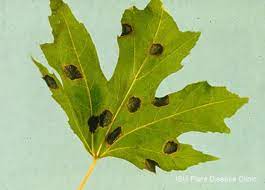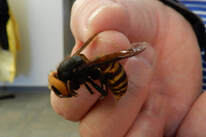AuthorLyn Chimera is a Master Gardener, consultant and lecturer. Archives
May 2023
Categories |
Back to Blog
One Problem, One Not10/7/2021  By Lyn Chimera One of the things I do as a Master Gardener is man the Hotline to answer people’s gardening questions. In the past month we have had many calls about Maple leaves with black spots, maple leaves dropping early and people spotting the Killer Hornet. Here is some information on both issues. Tar spot on Maples. Info adapted from the Cornell fact sheet. WNY is experiencing an increase in tar spot this season. There are actually several different fungi in the genus Rhytisma that infect the leaves of maples and cause raised, black spots to form on upper leaf surfaces. (see photo) The diseases are called "tar spots" because their appearance so closely resemble droplets of tar on leaf surfaces. Tar spot alone is rarely serious enough to threaten the health of trees, but sometimes there can be so many spots that the tree becomes unsightly. Heavy infections can also cause early leaf drop, a condition that causes homeowners to have to rake before autumn officially arrives. Norway maples are not native and brought the fungus with them when they came from Norway. It is a common street tree because it can withstand the stress of growing in less than optimum conditions. Norway maples are not the only trees affected by the fungi in the genus Rhytisma. Tar spot also infects silver, sugar, and red maple as well as their relative, box elder. For more info on Tar Spot: http://plantclinic.cornell.edu/factsheets/tarspotofmaple.pdf The best way to control is to rake up and remove all infected leaves. Spraying of fungicide is not recommended since tar spot doesn’t severely harm trees and the fungal spores travel in the air. You would have to spray the whole neighborhood to make a difference. If you want to plant a tree it’s always best to choose a native that is suited to our area and your site. Note: If maple leaves crinkle and turn brown in June or July, another common disease of maple may be present. Refer to the Cornell fact sheet on Anthracnose of Trees and Shrubs for more information. plantclinic.cornell.edu/factsheets/anthracnoseoftrees.pdf  The Asian Giant Hornet (Vespa mandarinia) is another question we’ve been hearing a lot about. The name you’ve heard on the news is Murder Hornet. Just the name makes one worry. The Asian giant hornet is the world’s largest hornet at 2 inches long! (see photo). It was initially spotted in British Columbia and Washington state in 2019. The nests found were destroyed. This hornet is problematic because it attacks and destroys honeybee hives and is aggressive toward people. Because the Asian Giant Hornet looks similar to some large hornet and wasp species here, we are getting many calls of sightings of the “murder hornet”. None have been confirmed. Two of the most common insects people see here that they think are the Asian giant hornet are The German yellowjacket (Vespula germanica) and the European Giant Hornet (Vespa crabro L.) The yellowjacket is colored in black and yellow and the abdomen typically has a small spade-shaped black mark on the first abdominal segment and a series of black spots down both sides from the second to the fifth segments. The adult European hornet worker is approximately 1 inch in length with yellow and brown coloration. Sharon Bachman, the Invasive Species person at the Cooperative Extension, explained the visual difference between the Asian giant hornet and others. The yellow and black bands on the AGH are solid stripes while the other large species have irregular stripes with “crown like” protrusions. Bottom line is the Asian giant hornet has not been identified outside the northwest so you don’t have to worry. The Hotline is a free service to those living in Erie County. If you have a garden related question, need a soil pH test, insect, or disease identification you can call 716-652-2432 ext. 137, Monday, Wednesday, and Friday from 9-12. Due to Covid the offices are closed so your call will not be answered directly. Leave a message and a Master Gardener volunteer will get back to you during those hours. Some volunteers are working from home and others are at Cornell Cooperative Extension 21 S. Grove St. on the first floor. Happy Gardening! - - - - - - - - - - - - - - - - - - - - - - - - - - - - - - - Now is the best time to plan for improvements &/or changes for next year. Give us a call!
0 Comments
Read More
Leave a Reply. |

 RSS Feed
RSS Feed
